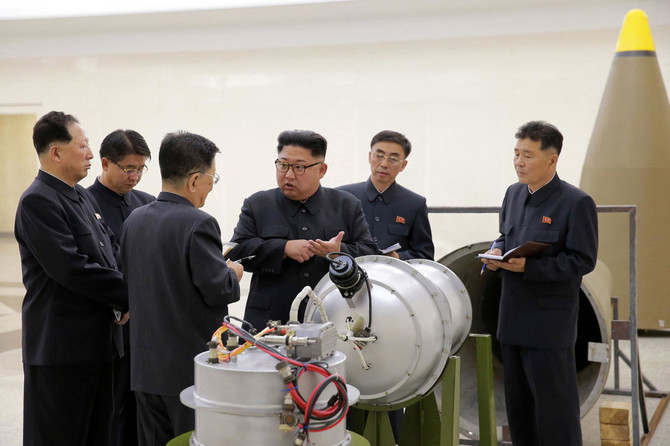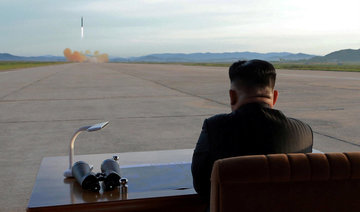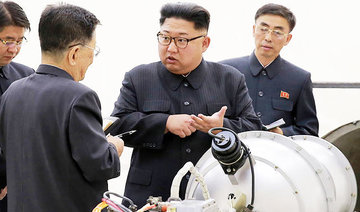SEOUL: North Korea said Saturday it was seeking military “equilibrium” with the United States as leader Kim Jong-Un vowed to complete Pyongyang’s nuclear program, which he said had “nearly reached the terminal.”
North Korea successfully fired a Hwasong-12 intermediate-range ballistic missile over Japan on Friday, responding to a new round of UN sanctions over its sixth nuclear test with its furthest-ever missile flight.
“Our final goal is to establish the equilibrium of real force with the US and make the US rulers dare not talk about military option for the DPRK,” leader Kim said, according to a report carried by the official KCNA news agency.
Kim said the country was close to the goal of completing its nuclear ambitions and should use all power at its disposal to finish the task, saying it had “nearly reached the terminal,” the official KCNA news agency reported.
Kim said Friday’s launch, which it described as a drill rather than a test, had increased the North’s “combat power of the nuclear force,” KCNA reported.
“We should clearly show the big power chauvinists how our state attain the goal of completing its nuclear force despite their limitless sanctions and blockade,” Kim said, according to KCNA.
The UN Security Council condemned Friday’s launch as “highly provocative” and US President Donald Trump scheduled talks with the leaders of Japan and South Korea to address the crisis.
The US Pacific Command confirmed Friday’s rocket was an intermediate range ballistic missile (IRBM) and said it did not pose a threat to North America or to the US Pacific territory of Guam, which Pyongyang has threatened with “enveloping fire.”
Seoul’s defense ministry said it probably traveled around 3,700 kilometers (2,300 miles) and reached a maximum altitude of 770 kilometers.
Yang Uk, an analyst with the Korea Defense and Security Forum, told AFP that Kim’s stated ambition of achieving a military balance was some way off.
“It’s too unrealistic for North Korea to reach equilibrium in nuclear force with the US,” he said.
The North has raised global tensions with its rapid progress in weapons technology under Kim, who is regularly pictured by state media overseeing launches and visiting facilities.
“The latest launch, which was apparently made from a TEL (transporter erector launcher or missile vehicle) instead of a makeshift launch pad, means the North is now ready to deploy the IRBM Hwasong-12 for combat purposes,” he said.
North Korea’s official party newspaper Rodong Sinmun allocated half its coverage to publishing pictures of the launch, showing the missile being launched from TEL.
“The North appears to have resolved technical difficulties in launching the missiles from TELs. With its mobility being increased, Hwasong-12 poses an imminent threat to the US and its allies in the region,” he said.
The North’s previous missile launch, a Hwasong-12 IRBM just over two weeks ago, also overflew Japan’s main islands and was the first to do so for years.
“Within three to five years, the North is expected to be capable of operating nuclear missiles as deterrence,” Yang Uk added.
Russian President Vladimir Putin and his French counterpart Emmanuel Macron jointly appealed for talks with North Korea, saying this was the only way to resolve tensions over its nuclear program.
The appeal was directed at the United States and Japan, countries calling to ramp up pressure through sanctions rather than pin hopes on talks.
Russia and China, North Korea’s main ally, on Monday backed a US-drafted resolution at the Security Council to impose fresh sanctions on Pyongyang — but they maintain dialogue is key to defuse the crisis.
The sanctions imposed on Monday banned the North’s textile trade, stopped new work permits for its laborers, and imposed restrictions on shipments of oil products, among other measures.
In response to Friday’s launch, South Korea’s military immediately carried out a ballistic missile drill of its own, with the defense ministry saying it took place while the North’s rocket was still airborne.
President Moon Jae-In told an emergency meeting of Seoul’s national security council that dialogue with the North was “impossible in a situation like this.”
But unless something changes, it is likely the tests will continue, said Professor Yang Moo-Jin of the University of North Korean Studies.
“There is high possibility that the North may test-fire another ICBM by the end of this year to prove it has mastered the technology,” he said.
North Korea seeks ‘equilibrium’ with US, says nuclear capability nearly complete
North Korea seeks ‘equilibrium’ with US, says nuclear capability nearly complete

Thousands estimated to flee Cambodia scam centers after crackdown

- Hundreds of thousands have been forced to work in online scam hubs across parts of Southeast Asia
- New wave of releases come after Cambodian Prime Minister Hun Manet pledged fresh crackdown
JAKARTA: Thousands of people are estimated to have been released from scam compounds across Cambodia over recent days, including more than 1,400 Indonesian nationals, who according to Indonesia’s Embassy in Phnom Penh have sought consular support to return home.
The online scam industry has flourished across parts of Southeast Asia in recent years, with hundreds of thousands of people forced to work in illicit operations in countries like Cambodia, Myanmar and Laos, according to a 2023 report by the UN Office of the High Commissioner for Human Rights.
A wave of foreign nationals released from scam centers in Cambodia have been seeking assistance from their embassies since last week, after Prime Minister Hun Manet pledged a fresh crackdown on the multibillion-dollar industry.
Jakarta’s mission in Phnom Penh said it has received reports from 1,440 Indonesian nationals since Friday.
“The number is quite huge, considering the Indonesian Embassy handled a total of 5,008 cases throughout 2025. Looking at the ongoing trend of law enforcement by local authorities, we expect that the flow of Indonesian nationals (seeking our assistance) will continue for some time,” the Indonesian Embassy said in a statement issued on Wednesday.
In an earlier release, the embassy said that some Indonesians traveled from provinces like Banteay Meanchey and Mondulkiri to reach the Cambodian capital, which would take them at least five hours by car.
“Following the arrest of a number of main perpetrators in various cities, many syndicate networks then disbanded and let their workers leave,” it said, while urging Indonesians to be more cautious.
“Don’t be easily tempted by unrealistic job offers abroad, promising high salaries with minimal requirements. Don’t get involved in online fraud operations abroad.”
Many trafficked foreign nationals were employed to run “romance” and cryptocurrency scams, often recruited to deceive strangers online into transferring large amounts of money.
Large queues of Chinese nationals have also been spotted in front of the Chinese Embassy in Phnom Penh this week, while Amnesty International has pointed to recent footage showing “the mass release and escape attempts from scamming compounds” across Cambodia.
In a statement issued on Friday, Amnesty said it had geolocated 15 videos and images, and reviewed social media posts that show people leaving, or having already left, multiple locations that have been confirmed as scamming compounds or identified as suspected sites for fraud operations.
“There are no official figures on the total number of scamming compounds in Cambodia, but for an Amnesty International investigation, our team visited 52 of 53 identified scamming compounds in 16 cities … a single scamming compound can employ thousands of workers,” Amnesty International Indonesia spokesperson Haeril Halim told Arab News.
He added that “many human rights violations” were found in the scamming compounds Amnesty investigated, including human trafficking, torture and other ill-treatment, forced labor, child labor, deprivation of liberty and slavery.
The recent releases of foreign nationals came after Chen Zhi, a Chinese-born Cambodian tycoon, was arrested and extradited to China earlier this month.
Chen was sanctioned by the UK and the US in October last year, with the US Department of Treasury accusing him of running “a transnational criminal empire through online investment scams targeting Americans and others worldwide.”
Estimates from the UN Office on Drugs and Crime show that scam victims worldwide lost between $18 billion and $37 billion in 2023.














